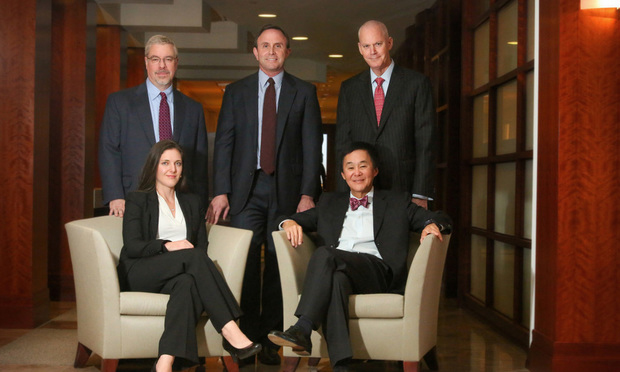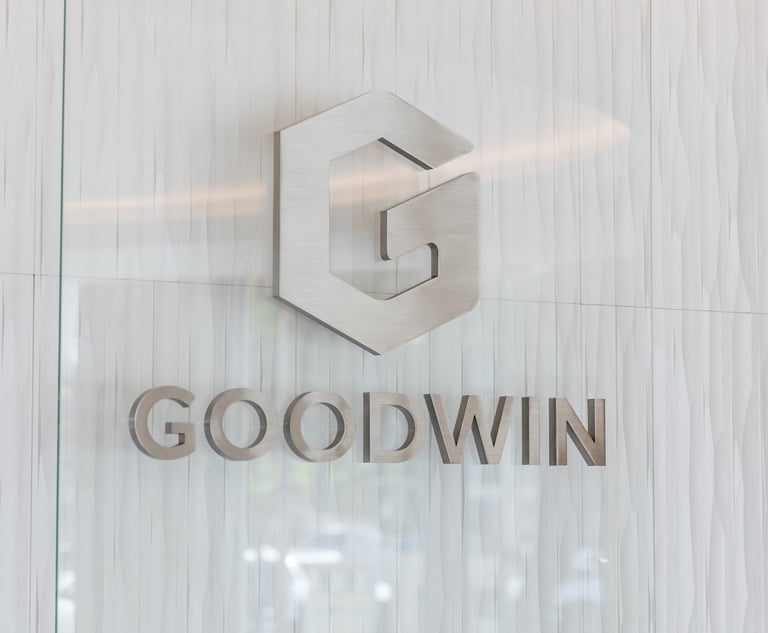High Stakes IP: Irell & Manella, Winner, IP Litigation Department of the Year
Irell & Manella lawyers get the call when clients' intellectual property cases present the most challenging legal and business issues.
December 21, 2017 at 01:55 PM
4 minute read
 From back left; Gary Frischling, Robert M. ("Bobby") Schwartz, David Gindler; front left; Rebecca Carson, Morgan Chu.
From back left; Gary Frischling, Robert M. ("Bobby") Schwartz, David Gindler; front left; Rebecca Carson, Morgan Chu.
Things didn't look so good for Irell & Manella client CBS Corp. when it was sued by a would-be class of music owners in 2015. They demanded hundreds of millions of dollars for unauthorized broadcast of their pre-1972 sound recordings. Sirius XM and Pandora Media had settled similar litigation for about $400 million.
"I think the plaintiffs' expectation was they wouldn't be litigating it, that we'd be settling," says Irell partner Robert Schwartz.
Then, during an early client phone conference, a member of the CBS Radio team remarked, "It's not fair. We're not even playing their recordings." In fact, CBS was using versions that had been digitally remastered for other labels years later.
Schwartz and Irell partner Victor Jih looked at each other and said, "Wait a minute …"
Nine months later, CBS was out of the case. Irell persuaded U.S. District Judge Percy Anderson that the remastered recordings contain sufficient original expression to put them beyond the reach of state copyright law. If upheld on appeal, the ruling will likely extinguish similar suits against iHeartMedia Inc. and Cumulus Media Inc.
That's just one of many high-stakes, high-value wins that make Irell The American Lawyer's IP Litigation Department of the Year. Others include a $506 million patent infringement verdict against Apple Inc.; a district court decision rejecting patent and antitrust claims against Gilead Sciences Inc.; and a U.S. Supreme Court order that preserved a landmark win on the patent eligibility of medical diagnostics.
And for a cherry on top, President Donald Trump has chosen Irell managing partner Andrei Iancu to head the U.S. Patent and Trademark Office.
Department Size and Revenue Partners: 22 Associates: 27 Counsel: 8
Department as Percentage of Firm: 55% Percentage of Firm Revenue, 2016: 56%
Partners Gary Frischling and Keith Orso defended Gilead from a suit by the AIDS Healthcare Foundation. It accused Gilead of illegal tying under the Sherman Act by marketing an HIV medicine known as TAF only as part of a fixed-dose combination, or drug "cocktail." Along with the suit, the foundation organized colorful protests outside Gilead headquarters.
But U.S. District Judge William Alsup rejected the foundation's theory, noting it could undermine the Food and Drug Administration's policy of encouraging the development of combination drugs. On appeal, the foundation has dropped its antitrust claims and now only seeks standing to sue over patent validity.
In 2015, Irell and the University of Wisconsin's tech transfer arm won a $234 million patent infringement judgment against Apple. The subject was "predictor" circuit technology developed by UW researchers and incorporated into Apple iPhone and iPad computers without the university's permission. Last year, U.S. District Judge William Conley more than doubled the award to $506 million, primarily to include royalties on sales during the litigation.
IP icon Morgan Chu, who tried the case with Frischling and others, says he's especially proud that three Irell associates, including a first-year, got to handle some witness testimony, "on the battlefield of a trial, while the shooting is going on."
Schwartz drew on Irell's young attorneys too, tasking them in the CBS case with locating an expert witness to testify about remastering. The associates pored over "tons of CDs" before determining that music engineer William Inglot would be the best choice, he says.
Along with saving his client millions, Schwartz believes the ruling will bring clarity to an issue that's generated conflicting rulings all over the country. In the entertainment industry, "Every time you mention pre-72, people say, 'Oh, what a mess,'" says Schwartz. "This will help clean it up."
Irell also scored at the Supreme Court, preserving a Federal Circuit decision that ruled a groundbreaking method for testing pregnant mothers for birth defects was not eligible for patent protection. Partner David Gindler helped Ariosa Diagnostics Inc. withstand a big amicus push from the biotech industry, not to mention dissenting opinions from multiple Federal Circuit judges.
Looking ahead, Irell says it has joined the Gilead Sciences team fighting a $2.5 billion verdict over hepatitis vaccine patents in post-trial motions. Irell is also representing Fundamental Innovation Systems International in asserting BlackBerry patents on USB fast-charging technology against Samsung Electronics Co. and LG Electronics Inc.
This content has been archived. It is available through our partners, LexisNexis® and Bloomberg Law.
To view this content, please continue to their sites.
Not a Lexis Subscriber?
Subscribe Now
Not a Bloomberg Law Subscriber?
Subscribe Now
NOT FOR REPRINT
© 2025 ALM Global, LLC, All Rights Reserved. Request academic re-use from www.copyright.com. All other uses, submit a request to [email protected]. For more information visit Asset & Logo Licensing.
You Might Like
View All

'Taking the Best' of Both Firms, Ballard Spahr and Lane Powell Officially Merge
6 minute read
Buchanan Ingersoll Launches in Chicago With 17-Lawyer Team From Locke Lord
4 minute read
Trending Stories
- 1Paul Hastings, Recruiting From Davis Polk, Continues Finance Practice Build
- 2Chancery: Common Stock Worthless in 'Jacobson v. Akademos' and Transaction Was Entirely Fair
- 3'We Neither Like Nor Dislike the Fifth Circuit'
- 4Local Boutique Expands Significantly, Hiring Litigator Who Won $63M Verdict Against City of Miami Commissioner
- 5Senior Associates' Billing Rates See The Biggest Jump
Who Got The Work
J. Brugh Lower of Gibbons has entered an appearance for industrial equipment supplier Devco Corporation in a pending trademark infringement lawsuit. The suit, accusing the defendant of selling knock-off Graco products, was filed Dec. 18 in New Jersey District Court by Rivkin Radler on behalf of Graco Inc. and Graco Minnesota. The case, assigned to U.S. District Judge Zahid N. Quraishi, is 3:24-cv-11294, Graco Inc. et al v. Devco Corporation.
Who Got The Work
Rebecca Maller-Stein and Kent A. Yalowitz of Arnold & Porter Kaye Scholer have entered their appearances for Hanaco Venture Capital and its executives, Lior Prosor and David Frankel, in a pending securities lawsuit. The action, filed on Dec. 24 in New York Southern District Court by Zell, Aron & Co. on behalf of Goldeneye Advisors, accuses the defendants of negligently and fraudulently managing the plaintiff's $1 million investment. The case, assigned to U.S. District Judge Vernon S. Broderick, is 1:24-cv-09918, Goldeneye Advisors, LLC v. Hanaco Venture Capital, Ltd. et al.
Who Got The Work
Attorneys from A&O Shearman has stepped in as defense counsel for Toronto-Dominion Bank and other defendants in a pending securities class action. The suit, filed Dec. 11 in New York Southern District Court by Bleichmar Fonti & Auld, accuses the defendants of concealing the bank's 'pervasive' deficiencies in regards to its compliance with the Bank Secrecy Act and the quality of its anti-money laundering controls. The case, assigned to U.S. District Judge Arun Subramanian, is 1:24-cv-09445, Gonzalez v. The Toronto-Dominion Bank et al.
Who Got The Work
Crown Castle International, a Pennsylvania company providing shared communications infrastructure, has turned to Luke D. Wolf of Gordon Rees Scully Mansukhani to fend off a pending breach-of-contract lawsuit. The court action, filed Nov. 25 in Michigan Eastern District Court by Hooper Hathaway PC on behalf of The Town Residences LLC, accuses Crown Castle of failing to transfer approximately $30,000 in utility payments from T-Mobile in breach of a roof-top lease and assignment agreement. The case, assigned to U.S. District Judge Susan K. Declercq, is 2:24-cv-13131, The Town Residences LLC v. T-Mobile US, Inc. et al.
Who Got The Work
Wilfred P. Coronato and Daniel M. Schwartz of McCarter & English have stepped in as defense counsel to Electrolux Home Products Inc. in a pending product liability lawsuit. The court action, filed Nov. 26 in New York Eastern District Court by Poulos Lopiccolo PC and Nagel Rice LLP on behalf of David Stern, alleges that the defendant's refrigerators’ drawers and shelving repeatedly break and fall apart within months after purchase. The case, assigned to U.S. District Judge Joan M. Azrack, is 2:24-cv-08204, Stern v. Electrolux Home Products, Inc.
Featured Firms
Law Offices of Gary Martin Hays & Associates, P.C.
(470) 294-1674
Law Offices of Mark E. Salomone
(857) 444-6468
Smith & Hassler
(713) 739-1250









